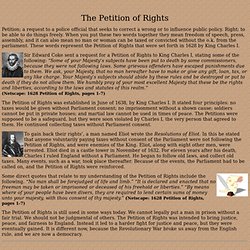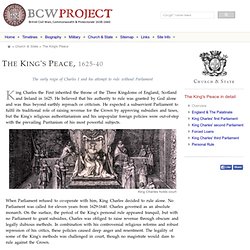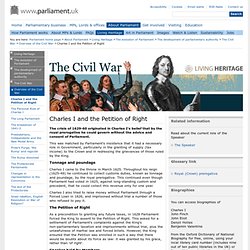

Citizenship. Petition of Rights. The Petition of Rights Petition; a request to a police official that seeks to correct a wrong or to influence public policy.

Right; to be able to do things freely. When you put these two words together they mean freedom of speech, press, assembly, and it can also mean no man or woman can be taxed or convicted without the o.k. from the parliament. These words represent the Petition of Rights that were set forth in 1628 by King Charles I. Sir Edward Coke sent a request for a Petition of Rights to King Charles I, stating some of the following: “Some of your Majesty’s subjects have been put to death by some commissioners, because they were not following laws.
The Petition of Rights was established in June of 1638, by King Charles I. To gain back their rights’, a man named Eliot wrote the Resolutions of Eliot. Charles the First and Parliament, 1625-29. The early reign of Charles I and his attempt to rule without Parliament King Charles the First inherited the throne of the Three Kingdoms of England, Scotland and Ireland in 1625.

He believed that his authority to rule was granted by God alone and was thus beyond earthly reproach or criticism. He expected a subservient Parliament to fulfil its traditional role of raising revenue for the Crown by approving subsidies and taxes, but the King's religious authoritarianism and his unpopular foreign policies were out-of-step with the prevailing Puritanism of his most powerful subjects. King Charles holds court When Parliament refused to co-operate with him, King Charles decided to rule alone. The Petition of Right. Charles I and the Petition of Right. This was matched by Parliament's insistence that it had a necessary role in Government, particularly in the granting of supply (tax income) to the Crown and in redressing the grievances of those ruled by the King.

Tonnage and poundage Charles I came to the throne in March 1625. Throughout his reign (1625-49) he continued to collect customs duties, known as tonnage and poundage, by the royal prerogative. This continued even though Parliament had voted in 1625, against long-standing custom and precedent, that he could collect this revenue only for one year. Charles I also tried to raise money without Parliament through a Forced Loan in 1626, and imprisoned without trial a number of those who refused to pay it.